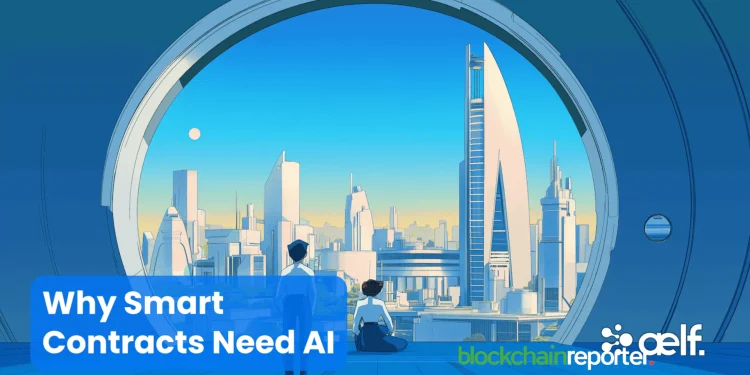AI is billed as today’s ‘internet moment’ from the nineties. We get to outsource mundane tasks in our lifestyles to an algorithm, and businesses get to rack up savings in money and time. It has become rapidly adopted to the extent that it is seeping into emerging technologies like blockchain and Web3.
Smart contracts, a critical component of blockchain, are self-executing contracts with the terms of the agreement directly written into code. In other words, think of digital agreements that automatically enforce themselves when pre-determined conditions are met, all without middleman intervention or tampering.
This automated system operates on a blockchain, ensuring everything is transparent and tamper-proof.
But if smart contracts can already offer such a level of automation and transparency, why is there still the case for blockchain needing AI as its partner in crime?
The Limitations of ‘Smart’ Contracts
Rigidity is one such limitation. Smart contracts are designed to operate exactly as coded, which means that any small error or vulnerability in the code can lead to significant issues. Unlike traditional black-and-white contracts, where ambiguities can sometimes be resolved through negotiation or legal interpretation, smart contracts follow their code to the letter, which can result in unintended consequences.
For instance, consider a DeFi lending platform that uses smart contracts to automate loans between users. If a borrower defaults due to a sudden job loss, the smart contract cannot autonomously decide to restructure the loan or offer a grace period.
While smart contracts offer enhanced security through cryptographic principles, they are not immune to hacking. The decentralised nature of blockchain means that once a smart contract is deployed, altering newfound vulnerabilities can be extremely challenging.
In August 2021, token swapping platform Poly Network suffered an audacious heist in which hackers stole more than $600 million worth of cryptocurrency, before returning it 48 hours later.
Addressing Limitations: How AI Overcomes Smart Contract Limitations
While smart contracts are powerful, they face limitations like rigidity and immutability once deployed. AI addresses these challenges by introducing flexibility and adaptability through machine learning algorithms, enhancing decision-making and reducing manual interventions.
Additionally, AI boosts transparency, security, and reliability by monitoring transactions in real-time and improving the accuracy of data from oracles.
| Smart Contract Limitations | What AI Smart Contracts Can Do |
| Rigidity in decision-making | AI smart contracts evolve based on continuous assessment of data inputs and environmental variables, allowing flexibility in decision outcomes |
| Manual patching of security gaps | AI can monitor transactions in real-time, identify suspicious activities, and take preventive measures autonomously |
| Oracles: Single points of failure | AI’s sophisticated algorithm mitigates risks of inaccurate external data by aggregating and cross-referencing against multiple sources |
Similarly, aelf, a layer 1 AI blockchain, overcame some of these challenges by bringing AI technologies into its architecture, which features a mainchain, customisable sidechains, and a ZK-Rollup Layer 2 solution for scalability.
Through strategic partnerships with AI innovators like AgentLayer and ChainGPT, aelf has enabled smart contracts to evolve beyond their rigid nature. Besides supporting smarter developmental efforts for the next generation of dApps, and helping sustain a robust performance in the blockchain network, it is capable of intelligent decision-making to respond to dynamic situations.
Looking ahead, aelf’s pipeline includes an AI oracle that promotes an even stronger synergy between the aelf chain and AI-powered dApps.
Other Cool Benefits of Integrating AI with Smart Contracts
Streamlined Compliance and Regulatory Requirements
AI integration can streamline compliance and regulatory requirements.
- Machine learning models can be trained to interpret and apply various compliance rules automatically
- This reduces manual effort and the risk of human error
- Ensures that smart contracts remain compliant with ever-changing legal standards, especially in the highly regulated financial sector
Upgraded Usability for Developers and Users
AI Natural Language Processing (NLP) plays a pivotal role in enhancing usability and advancing Web3 development, considering that the average person on the street may not have a specialised grasp of coding languages.
- By leveraging NLP, AI systems can comprehend and interpret human language more effectively, simplifying the creation and management of smart contracts
- This natural language understanding allows developers and users to interact with smart contracts in a more intuitive manner, reducing the barrier to entry and making the technology accessible to a broader audience
- NLP-driven AI can automatically translate complex legal and technical jargon into plain language, ensuring clarity and minimising misunderstandings
Data Privacy, Made Even More Private
Discussions around blockchain and smart contracts often gravitate towards transparency. AI can be instrumental in bolstering data privacy, a rising global issue in our highly interconnected world.
- AI algorithms can anonymise sensitive information before it gets processed by smart contracts. Users benefit from blockchain’s immutable ledger, and personal or sensitive data remains confidential.
- AI’s ability to dynamically assess and encrypt data at various stages of the transaction process adds an additional layer of security, especially in healthcare or finance
- Not only are transactions made secure, personal information remains private — a win-win situation
Case in Point: AI Smart Contracts in Ride-hailing
Have you taken your fair share of ride-hailing and lamented how fares always seem to be artificially inflated, even during non-peak timings? Or, if you’re a driver, have you ever had to contend with runaway passengers, or no-shows?
Albeit more theoretical than tried-and-tested at this point, AI smart contracts can go a long way in making the ride-hailing experience more pleasant for both parties. Let’s look at how a decentralised ride-hailing model makes this happen.
AI Smart Contracts in Ensuring Fair Pricing and Automated Payments
In the traditional ride-hailing model, centralised companies have the ability to control pricing algorithms and manipulate surge pricing during peak hours or special events. This can lead to situations where riders feel exploited, and drivers may not receive a fair share of the earnings.
AI smart contracts offer a potential solution to these issues by creating a decentralised and transparent pricing mechanism.
- Dynamic Pricing based on Real-Time Data: AI algorithms can analyse various factors in real-time, such as traffic conditions, demand, weather, and even driver availability, to determine fair and dynamic pricing for rides
- Manipulation-free Pricing: The pricing logic would be embedded within the smart contract, making it visible and immutable on the blockchain. This ensures transparency and eliminates the possibility of arbitrary price manipulation by the platform.
- Automated Payments: Once a ride is completed, the smart contract would automatically execute the payment process, ensuring that both drivers and riders receive their fair share without delays or disputes
- Dispute Resolution: In case of any disagreements or discrepancies, the smart contract could incorporate a dispute resolution mechanism, leveraging AI to analyse ride data and provide impartial recommendations for resolution
For example, if a passenger is unfairly charged for tolls or a longer-than-usual route, the AI algorithm can gather data from the ride, including GPS coordinates, distance traveled, and time taken, to detect discrepancies and adjust final fares or refunds accordingly.
This ensures both parties have a transparent and unbiased way to resolve their dispute.
Benefits:
- Fairness and Transparency: AI smart contracts ensure that pricing is determined based on objective data and algorithms, eliminating the potential for unfair surge pricing or biased decision-making
- Efficiency and Automation: Automated payments and dispute resolution streamline the entire process, reducing administrative overhead and improving efficiency for both drivers and riders
- Trust and Accountability: The immutability of smart contracts on the blockchain creates a trustless environment where all parties can rely on the pre-defined rules and logic
Challenges ahead:
- Data Privacy: The use of AI in ride-hailing platforms requires careful consideration of data privacy. Anonymisation and encryption techniques should be employed to protect user data while still enabling the AI to function effectively.
- Algorithm Transparency: The AI algorithms used for pricing and decision-making should be transparent and explainable to ensure accountability and avoid potential biases
- Community Governance: Decentralised platforms could incorporate community governance mechanisms to allow stakeholders (drivers, riders, developers) to participate in decision-making and platform evolution
In Closing
Based on this decentralised ride-hailing case study, we can see how AI smart contracts make a more compelling application than traditional smart contracts. By being in a position to dynamically respond to unique circumstances or conditions, it can decide on custom solutions to resolve disputes, and also draw on accurate data streams. This is surely an appropriate proposition for the near future, when driverless taxis start hitting the mainstream lanes.
These capabilities mark a step towards a more robust, reliable, user-friendly, and truly intelligent blockchain technologies. but the focus must also be on ethical considerations, security implications, and the necessity for transparent processes. After all, intelligence—whether human or artificial — is best leveraged with a keen sense of responsibility and foresight.
*Disclaimer: The information provided on this blog does not constitute investment advice, financial advice, trading advice, or any other form of professional advice. Aelf makes no guarantees or warranties about the accuracy, completeness, or timeliness of the information on this blog. You should not make any investment decisions based solely on the information provided on this blog. You should always consult with a qualified financial or legal advisor before making any investment decisions.
About aelf
aelf, an AI-enhanced Layer 1 blockchain network, leverages the robust C# programming language for efficiency and scalability across its sophisticated multi-layered architecture. Founded in 2017 with its global hub in Singapore, aelf is a pioneer in the industry, leading Asia in evolving blockchain with state-of-the-art AI integration and modular Layer 2 ZK Rollup technology, ensuring an efficient, low-cost, and highly secure platform that is both developer and end-user friendly. Aligned with its progressive vision, aelf is committed to fostering innovation within its ecosystem and advancing Web3 and AI technology adoption.
For more information about aelf, please refer to our Whitepaper V2.0.
Stay connected with our community:























